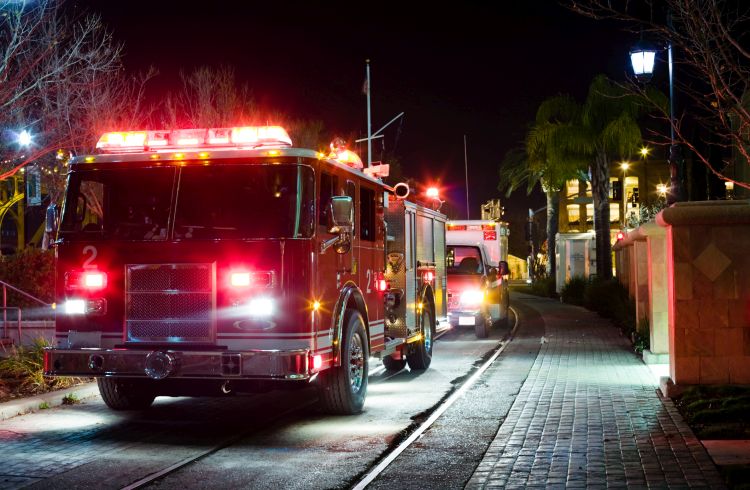10 Safety Tips if There's a Fire in Your Accommodation
If a fire broke out in your accommodation, would you know what to do? From avoiding smoke inhalation to how to attract attention for help, here are 10 tips to stay safe.
 Photo © GettyImages/slobo
Photo © GettyImages/slobo
A few minutes of thinking "What would I do if this happened" can be the difference between having a scary story to tell afterwards, and not making it out alive.
- Emergency Exit Routes
- Preventing Smoke Inhalation
- Getting Help
- How to Escape
- Top 10 Fire Safety Tips
Emergency Exit Routes
Most travelers want to just dump their bags and get out, so they can make the most of the rest of the day or evening at their destination but take a few minutes to look around for the entrances and exits, especially those close to your room.
During a fire, there is a lot of heat, confusion, panic and smoke. Throw in reduced vision, confused thinking and that can cause someone to make a bad judgement. Knowing where the exits of a building are may seem like an easy thing to do, but could you find your way there, blindfolded and crawling? This is basically what escaping a fire is like.
Thinking about what you would do if the fire alarm goes off or you are alerted to a fire can make evacuating much smoother. If you are prepared for an event, chances are it won't be as scary as if you're unprepared. Think about where you would go, what you would take with you and how you can stay safe when evacuating.
Preventing Smoke Inhalation
Most deaths in fires come from smoke inhalation and not actually burning. Fire smoke contains a variety of irritants which cause asphyxiation, making it difficult to breathe.
Should you find yourself in a room and smoke is coming under your door from a fire in a nearby room or hallway, you need to assess the threat to you. This is best done by first checking your room door. Feel the door first, with the back of your hand. If the fire is behind the door, the handle may be hot which could burn you. A burn to the back of the hand may hurt, but still allows you to use that hand. If the door is hot to the touch, don't open it and you will need to look for another way out.
For that smoke coming in under the door, stop the crack up with a wet towel from the bathroom. Turn off any air conditioning or fan in your room.
Finding out what is happening is important. Try calling the reception desk and asking what is happening. If there is no answer at reception, call the local emergency number and tell them where you are.
Getting Help
If you are trapped in your room and are unable to get out, you will need to get attention from rescuers to let them know where you are.
Open your window and try to shout for help; even throw things like toilet paper rolls, sheets or clothing down to the ground below. Firefighters are trained to look for signs of people needing rescue.
Be cautious that fire on nearby floors can mean smoke funneling into your open window. Hang a wet towel or sheet in the window, this can help decrease the smoke coming into your room and still signal for help. Fire rescue crews often have ladder trucks which can help rescue people from upper floors, however they can be limited depending where you are. Major city fire department trucks can have ladders which reach ~13 storys. Remember this when selecting your room.
How to Escape
The goal of a fire evacuation is to get out safely. Obviously, this should be done as quickly as possible but avoid running.
If you need to evacuate quickly, don't even think of trying to grab all of your stuff. Gear is replaceable, you are not; however it's a good idea to keep your room key and valuables such as personal ID, wallet etc. next to your bed in a bag to easily grab on the way out if possible.
If it's safe to exit your room via the door to escape the fire, consider jumping in the shower and wetting yourself down while dressed before you leave. Wet a towel, sarong, t'shirt or scarf to wrap around your head and mouth. Synthetic clothing may melt to your skin in hot temperatures; natural fibers generally don't. Don't even think about trying to take an elevator, as this might lead to you becoming trapped inside, on the way down. Instead, look for stairs as your method of escape.
Smoke and heat rise, so the hotter and smokier parts of a space will be towards the ceiling. You can avoid this by staying low and crawling under the heat and smoke, on your hands and knees.
During your evacuation, you may come in contact with fire and your clothing may catch alight. Remember to "stop, drop and roll". If you are on fire, resist the temptation to run as this will only make the fire grow in size. Instead, drop to the ground and begin to roll, which helps put the fire out.
If you see somebody else on fire, get them to stop, drop and roll or you can try to smother the fire with a blanket.
If you are traveling with others, agree on a meeting spot in case of trouble. This is usually a point outside near the hotel such as a cafe or signpost. This avoids the problem of not knowing where people are. If they are safe, they should be waiting for you at your meeting spot.
Top 10 Fire Safety Tips
- As you check in, make sure you know the locations of all the exits near your room
- Take a minute to think which way you'd go to escape your room
- Assume all fire alarms are real
- Check your door for heat
- If safe, shower yourself while dressed then leave your room and make your way to the emergency exit
- Stay low on your way out to avoid heat and smoke
- If door is hot, look for another exit
- Block smoke from entering room with wet towels or sheets
- Signal for help by yelling or dropping items below window
- If traveling with others, get out and get to your meeting spot.
There are several portable smoke detectors that can be carried for extra peace of mind in accommodation without smoke detectors, especially those which are basic or haven't had a renovation in a while. They also take up very little room in your luggage.
Calm thinking and a little pre-planning can assist greatly if the situation arises where you will need to evacuate during a fire.
Related articles
Simple and flexible travel insurance
You can buy at home or while traveling, and claim online from anywhere in the world. With 150+ adventure activities covered and 24/7 emergency assistance.
Get a quote
No Comments